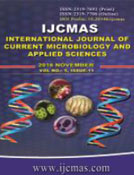


 National Academy of Agricultural Sciences (NAAS)
National Academy of Agricultural Sciences (NAAS)

|
PRINT ISSN : 2319-7692
Online ISSN : 2319-7706 Issues : 12 per year Publisher : Excellent Publishers Email : editorijcmas@gmail.com / submit@ijcmas.com Editor-in-chief: Dr.M.Prakash Index Copernicus ICV 2018: 95.39 NAAS RATING 2020: 5.38 |
The research was carried out to investigate the effect of spent laptop battery on soil bacterial and fungal populations. A stock solution of the battery was prepared by soaking the laptop batteries for six months in sterile distilled water. Various concentrations of the toxicant; 12.5, 25.0, 50.0, 75.0 and 100ml were added to the soil samples. Samples were taken out of each setup for analyses at intervals of: 0, 7, 14, 21 and 28days with unpolluted soil samples to serve as control. The soil samples were analyzed for total heterotrophic bacterial and fungal counts. The results showed that the toxicant concentrations do not have significant effect on bacterial populations when compared with control, while for the fungal communities there was a general decrease in population from days 0 to 28, and significant difference between the higher concentrations and that of the control. At the beginning of this study; day zero, the following fungal genera were isolated and identified: Penicillium, Cladosporium, Fusarium, Rhizopus, Mucor, and Aspergillus while at Day 28 only Aspergillus niger and Fusarium sp were seen in the lowest toxicant concentration. It was also observed that, the fungal populations were more inhibited by the toxicant, while the bacterial populations were more resistant. It is important to note that, continuous disposal of batteries into the soil environment can cause detrimental effects, not only to man, but also to other living things and the microbial populations on which other life forms depends for their activities. This could in turn bring about ecological imbalance, retard decomposition processes and other biochemical and metabolic activities carried out in the soil by these organisms.
 |
 |
 |
 |
 |